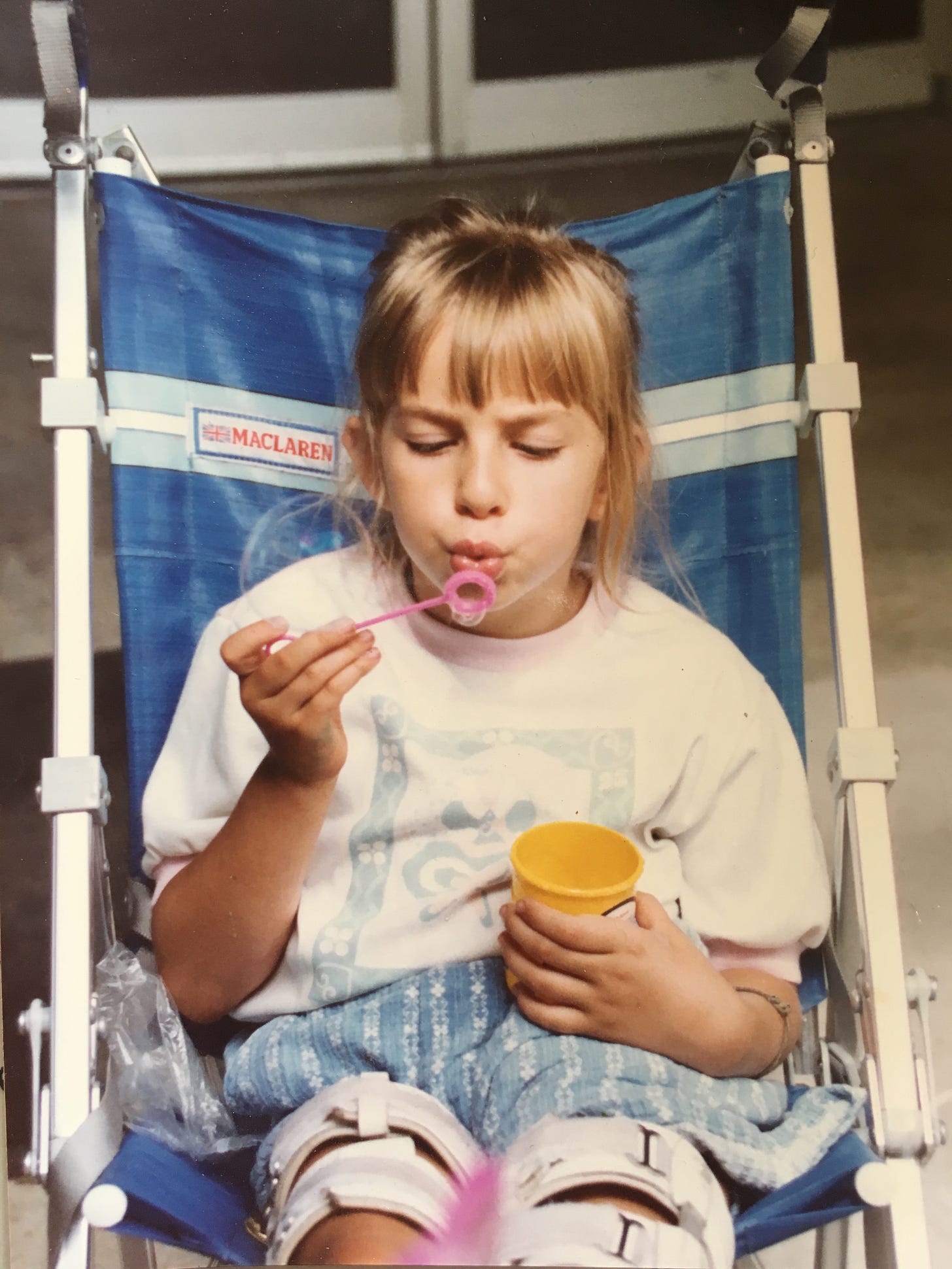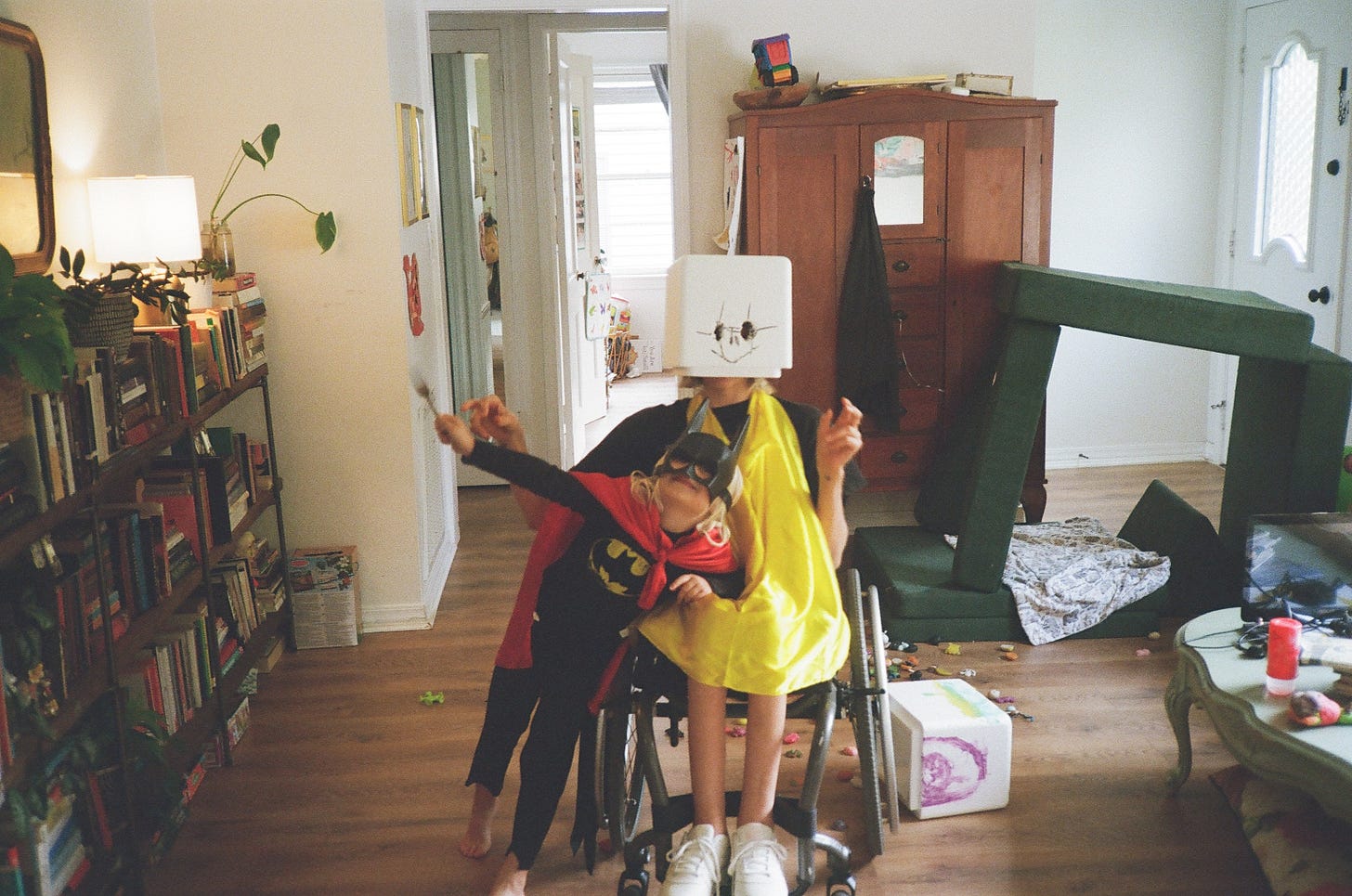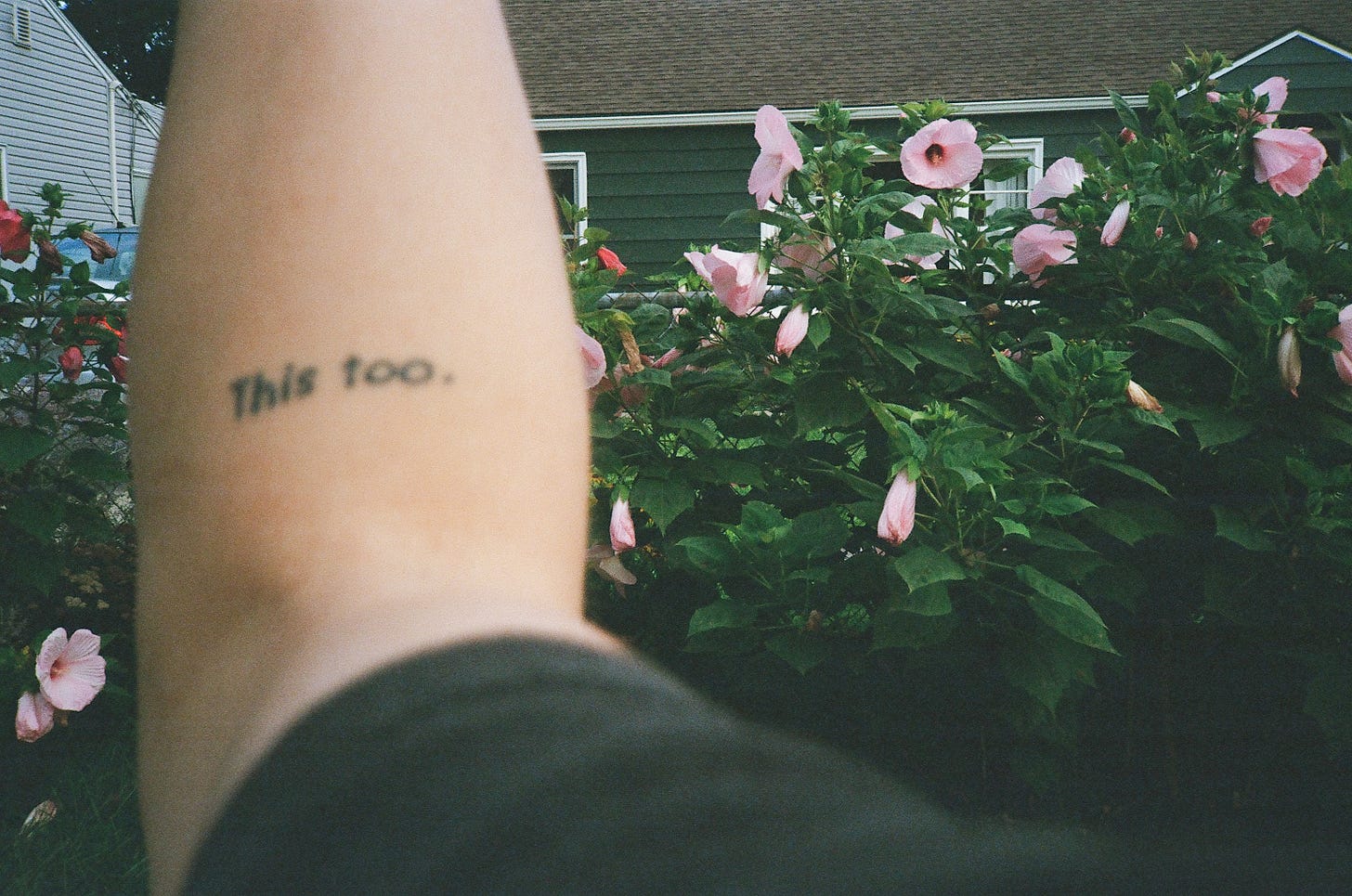Folks using screen readers and anyone who prefers to listen — there’s an audio player bar just below this paragraph, with a play button on the far right. Please let me know if you have any trouble with it.

Soon after I stopped walking, I started seeing a renowned pediatric neurologist. Even as a little kid, I knew this woman was important. We would wait for her for what felt like half the day in this eerily quiet, perfectly sterile, basement room miles from sunlight or the sound of birds. My dad’s voice reading aloud the latest Reader’s Digest would blur into white noise as my head rested on my mom’s lap, halfway between waking and dreaming – are we in hell’s waiting room? – when BAM. There she was, bursting into the room surrounded by her flock of residents, all smiling professionally, all looking at me.
She was a short woman with a loud voice who would push her face close enough to mine that I could smell the powder she wore on her cheeks. It’s been more than 30 years, and it is not hard for me to conjure the sound of her voice – impatient, unrelenting, inescapable.
Her job was to assess the extent of the nerve damage the surgeries and radiation had done to my body. How much could I feel? How strong were my legs? Was I improving? Or…no. She carried a collection of objects in her white doctor’s coat; I remember the safety pin. I would sit on the edge of the hospital cot, thin white paper crinkling beneath me. Every person in the room would go quiet, eyes focused on me, as she pressed the safety pin – sometimes the curved top, sometimes the sharp point – against different parts of my body: my shin, my ankle, the bottom of a foot. I wasn’t allowed to look – just wait until I felt something. It was the ultimate test – like standing on a spelling bee stage – and my body held all the answers if I could just concentrate hard enough. I’d turn off all of my other senses, straining to feel the press of that safety pin, every cell in my body on high alert.
“Do you feel this?” she would ask. There’s that voice – like a chain yanking me to attention.
Did I feel it? I’d wait. I’d wonder. Was that a flutter? A sort of tickle on my left ankle? “Yes?”
“Where?”
“My left ankle.” I’d wait for her to blare the buzzer to tell me I’m wrong.
“Do you feel it like a nickel, like a dime, or like a quarter?” she’d press.
I’d pause. How much is a…
“Like a nickel, like a dime, or like a quarter?” she’d repeat, louder, slower, sharper.
Can we pause for half a second to ask why a pediatric neurologist hasn’t been told that most four year olds don’t know how to count change? I’d lead that training session! It could be real short. Maybe just a poster. PSSSST. 4 year olds aren’t your target audience for currency analogies!
“Like a dime?” I’d say, willing this moment to end.
One particularly awful time, I remember her concluding the whole exercise turning to her residents as she told me, “I wasn’t touching your ankle.” And in my memory, her whole team started scribbling notes in their charts.
We performed this ritual annually for years. And the story I took with me was that my body was broken. My body failed every test. My body would betray me – hang me out to dry – right there on the spelling bee stage. And as I grew older, instead of learning to listen to my body or work with my body or look to my body for clues, I became five-stars excellent at ignoring my body. I slipped out and away, much more comfortable immersing myself in the land of thinking and words – a universe I could control through the levers of my mind. I could convince myself it was a great idea to marry my high school boyfriend even though my body cringed when he touched me. Instead of reading panic attacks as clues that I might need some support, I dismissed them as my own childish dramas and plowed ahead. That gut feeling you have? Can’t be trusted. Feel that pain? Best to ignore it. Whatever you do, don’t let it show on your face.
I wish this was the part of the story where I could tell you about the afternoon when everything changed. I mean, so much has changed in me and the great wide world since I was that four year old trying to feel the sharp end of a safety pin. I grew up to claim disability as an identity with pride, wrote a whole book about a life lived from this particular point of view, and now I regularly sit on stages across the country where I have the microphone to talk about disability in the way that makes the most sense to me. In fact, I often use that microphone to tell people the importance of staying connected to our bodies. These physical forms are the filter through which we experience the most mundane and magnificent, devastating and joyful moments of our lives, from our first to our final breath. If we learn to live at odds with our bodies – ignoring and disconnecting from our bodies – blaming and shaming our bodies – I think the experience of our entire lives is diminished.
But actually staying connected to my body? In everyday real life? That is a skill that continues to evade me. How does one actually stay for longer than a fleeting moment? Please, someone tell me – exactly – how do I do it? Because it feels like trying to grow a new organ. I often don’t realize I’m hungry until I’m FAMISHED, don’t rest until my body is SCREAMING, don’t know I’m stressed until I’m FURIOUS at EVERYONE. I don’t see the water seeping through the floorboards until the ship is going down. The older I get the more important it seems to be and the harder it is to actually do it and stay.
But it’s quite inconvenient to listen to my body. As it ages, it’s taken on deeper, sharper, louder, pain – the kind that greets me in the morning and clangs like angry cymbals by night. My body prefers to move so slowly when I would like to go faster, even faster, please. I drag it around from place to place, task to task, event to event like a reluctant toddler. Shhh, we’re okay, here’s some Tylenol, now be a good girl. To listen feels like letting the screaming toddler drive the car. Away from the life I want to live.
And also. I have this son. I grew him in this fantastical, war-torn body of mine – this pulverized landscape, this crumbling machine, this unlikely home. And he feels everything. His emotions blaze through him – white hot. They take over his body and come out in screams, howls, and streams of big words he only understands through the size of our reactions. His hugs arrive as surprise attacks – he finds a perch, opens his arms as wide as they can reach, and jumps on me like a spider monkey, limbs flailing, heads bonking, a lightning burst of explosive affection.

I find it very easy to tune into his body. I’ve become a sort of dedicated meteorologist, reading his cues, gathering the data, trying to decipher if a hurricane might be on the horizon. Are you hungry? I ask, mentally flipping back through his recent meals – has he gotten enough protein? Could he be constipated? I bring him plates of blueberries and slices of meat. We give him words like “hangry.” “It’s hungry plus angry,” he tells us, quietly delighted by the word math. I track his sleep on a little app and haven’t missed a night or a nap in a year. When I draw a character differently than he imagined, and he yells “You’re such a meanie! That’s it! You’re not drawing with me ever again!” I say, “Oh, kid. I think your body is tired.”
“I’M NOT TIRED, you beast!!” (He’s collected most of his insults from a book series that stars a character aptly named Rascal.)
“You might not feel sleepy, but your body tells you it needs to recharge its batteries when everything feels extra hard. It’s the same for me and your daddy!”
One night he’s swept into a tantrum that breaks all the scales. His screams are louder, his face is redder, his veins are popping. The house fills with his rage – or is it fear? – until all three of us have officially left our bodies. I pull Otto onto my lap, kicking and writhing, and put two of my fingers on the pulsing vein in his neck. I whisper right into his ear – “Thudthudthudthudthudthud – can you feel that? That’s your heartbeat! Wow! It’s beating so fast! Here, feel mine!” He’s still crying as I pull his hand to my neck. “Do you feel that?” I ask. “So fast, right?” I’m not sure he can even hear the words I’m saying, but I continue. “You know what we can do to slow down our heartbeats? Breathe! Can you take some deep breaths with me?” I pull his hand to his chest. “Let’s try.” His chest rises and falls, rises and falls, his breath shallow and quick. I pull his hand to my chest and do my best to breathe long and slow. I try to catch his eyes. His breathing is still ragged, but the screaming starts to recede. We take turns feeling our breaths, our heartbeats, until everything slows. I feel his body get heavy and soft against mine. “Thud-thud, thud-thud,” I narrate the sound. “Do you feel that?” He looks at me. “Yeah?” I ask. “Yeah??” I’m almost giggling in relief, amazed by the mysterious power of being here, together, in our bodies.
I’m assembling a lego castle with only my tastebuds, leading us through a maze made of marbles, piloting a kite to the moon. Which is to say – I do not know what I’m doing. But maybe there’s a tiny part of me that does? A littler version that just wants to say – Hold on, give me a second. It’s a lot to be here. Maybe I don’t feel that, but I do feel this and this and this too. I’m here. Just give me a second to breathe.

CHEWY QUESTIONS – If you want to continue to think through the ideas here, these questions are for you – please feel free to explore this in your personal writing, to talk about it with your people, or to join the conversation on Substack.
What stories did you learn about your body when you were younger? Are they still with you? Have you found a way to revise them?
What analogy makes the most sense for describing your relationship with your body? Are you allies? Are you the demanding coach, the patient parent, the manipulative big sister? Is your body the wise sage or the flighty friend?
Have you found ways to stay present in your body? What does it feel like? And, um, could you maybe tell us how to do it?
Thank you for being here.
xo
Rebekah





Hey could you maybe stop making me cry every time I read your newsletter? ;) Oof. I’ve come a long way in connecting to my body, but this made me realize how often I’m still trying to wrangle it into submission, making it fit my life instead of seeing the ways I might need to shift my life around it. Mary Oliver’s phrase “the soft animal of your body” keeps flitting through my mind as I think about it. Can I hold this soft animal in my arms and spend a lazy morning dreaming instead of forcing it out into the cold, kicking and screaming? Can I offer it small delights to sustain it as it deals with this big scary world? Can I build trust with it? I’m not sure if any of those analogies make sense lol, but I will have to ponder. As ever, I am so grateful for you—for your vulnerability, for your questions, and for your ability to put all these complex ideas into words we can contemplate and grow with <3
I always appreciate your reflections Rebekah. Feeling connected to our bodies is an ever-evolving thing. As you well know, there are times when “just go within” isn’t a friendly option…(which a yoga teacher once told me when I was in the height of my dizziness symptoms and I wanted to wring her neck!) But finding compassion for ourselves and our inability to feel it all at times is just as loving and being “tuned in.” So beautiful you have your little guy to show you what that looks and feels like in the most dynamic and life-affirming way.❤️